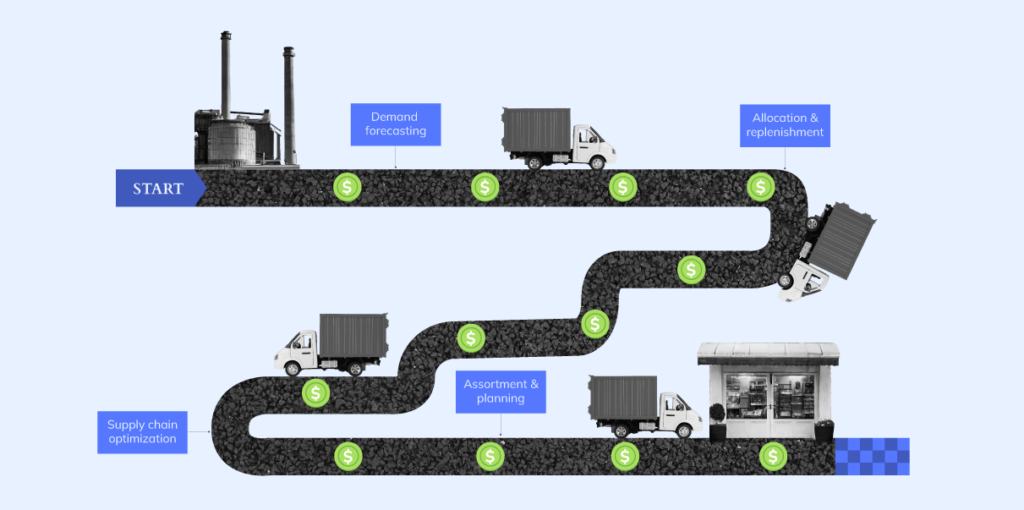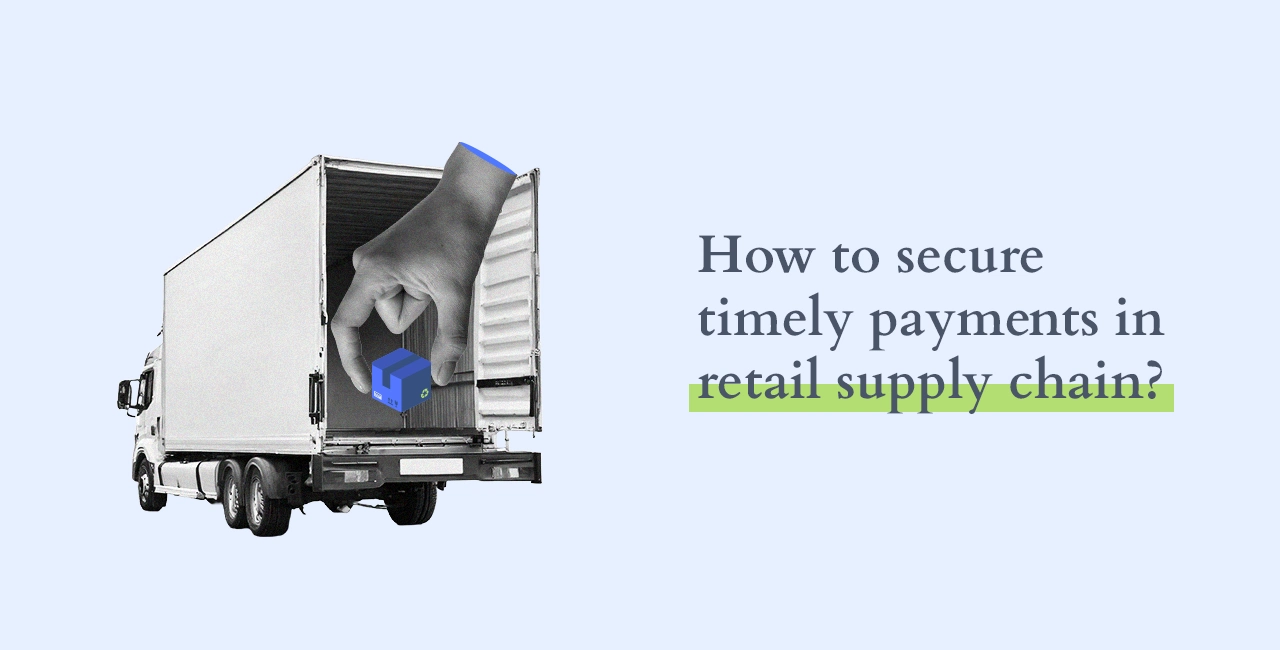The retail supply chain is a dynamic ecosystem in which products flow seamlessly from manufacturers to distributors, retail stores into the hands of eager consumers. Within this, third-party logistics (3PL) carriers emerge as a pivotal component of extended supply chains. They serve as the beating heart of a resilient supply chain that ensures not only timely deliveries but also satisfaction of customers.
The significance of 3PL carriers extends beyond the traditional retail and supply chain model. They are essential in several supply chain scenarios, optimizing supply chain management, and enhancing the efficiency of a company’s supply chain operations.
Some of the few supply chains where 3PL is crucial are:
- Manufacturing Supply Chain: 3PL carriers deliver raw materials to production facilities and transport finished goods to distribution centers or end-users. They play a critical role in keeping an uninterrupted flow of materials and products.
- E-commerce and Online Retail: The growth of e-commerce has placed immense pressure on timely deliveries. 3PL providers help online retailers manage inventory, order fulfillment, and last-mile delivery, making customers receive their orders promptly. This is especially important for the retail supply chain, where customer satisfaction is key.
- Food Transportation: Import and Export of Perishables: Food transportation is a specialized domain where 3PL carriers excel. Maintaining stringent quality control standards is paramount when handling perishable goods, including fruits, vegetables, dairy products, and seafood. 3PL providers leverage their expertise to manage the import and export of perishables. This ensures the products that are delivered to an end user in perfect condition through efficient distribution.
3PL carriers are necessary when a business products require efficient and reliable transportation. Whether it involves sending goods to retail stores, a distribution center, or directly to consumers’ doorsteps.
The Role of 3PL Carriers in the Retail Supply Chain

In retail supply chain management, third-party logistics (3PL) carriers play a pivotal role inbound and outbound logistics. It orchestrates the seamless flow of products from manufacturers to end consumers.
Their importance becomes increasingly pronounced as supply chain processes grow in complexity and global trade continues to evolve. We’ll delve into the complex details of how 3PL carriers play a crucial role in manufacturing processes and how retailers rely on them, focusing on their specialization in international shipping, customs clearance, warehousing, and their capacity to alleviate logistical burdens.
Significance in Managing Retail Logistics
3PL experts bring specialized knowledge, optimizing every facet of the process to ensure products reach their destinations promptly and cost-effectively.
Their role as supply chain managers becomes particularly critical when retailers deal with large inventory volumes and need to adapt swiftly to meet varying consumer and supplier demands.
Specialization in International Shipping
Most companies seek cost-effective manufacturing by sourcing raw materials and finished products internationally. 3PL carriers specialize in international shipping, with established networks and expertise in managing international regulations, import/export documentation, and customs compliance.
This expertise improves efficiency and enhances customer relationship management in cross-border trade.
Expertise in Customs Clearance
Customs clearance, a formidable obstacle in international trade, can be time-consuming for retailers. 3PL carriers streamline this aspect by taking charge of all customs clearance requirements.
They ensure that goods are accurately declared, tariffs are promptly settled, and all necessary permits and documents are meticulously arranged. This not only increases the movement of products across borders but also reduces the risk of delays or compliance issues.
Efficient Warehousing Solutions
An efficient retail supply chain is effective warehousing. Retailers require storage facilities that are strategically positioned to guarantee the timely availability of products.
They employ advanced inventory management systems and embrace just-in-time delivery strategies to keep inventory costs, curtail storage costs, and enhance overall supply chain efficiency.
Alleviating Logistical Burdens
One of the most substantial contributions of 3PL providers to retailers is their capacity to alleviate logistical burdens. By entrusting functions to 3PL carriers, retailers can dedicate their energies to core business operations such as marketing, product development, and customer service.
This specialization and delegation of tasks to 3PL partners empower retailers to improve operational efficiency, reduce overhead costs, and allocate resources more effectively.
3PL carriers are vital partners in retail supply chain management. Their expertise in international shipping, customs clearance, and warehousing and their ability to alleviate logistical burdens make them essential for retailers seeking to expand their global footprint and navigate global supply chain processes.
Punctuality in the Retail Supply Chain

Continuing our exploration of the 3PL carriers in the retail supply chain, punctuality is evident in effective supply chain management.
The significance of punctuality within the supply chain strategy is vital. With a specific focus on the consequences of delays on customer satisfaction and revenue, the heightened importance of punctuality for online retailers, and the fundamental role it plays in ensuring the overall efficiency of the supply chain.
The Impact of Delays on Customer Success and Revenue
The importance of timeliness in the supply chain extends beyond logistics; it impacts customer success and revenue generation.
Delays in product deliveries can frustrate customers, eroding their ability to fulfill promises and meet needs. This dissatisfaction often translates into lost sales, reduced brand loyalty, and negative word-of-mouth, all of which can harm revenue.
A 2023 study by McKinsey & Company revealed that even minor delays in international shipments, ranging from just 5-10%, can significantly decrease customer expectations by 12-15%.

This decrease is closely tied to a tangible revenue reduction of 5-10%. These statistics underscore punctuality’s pivotal role in maintaining customer trust and sustaining a healthy bottom line.
Payment Delays as a Contributor to Shipment Delays
In this section, we delve into the pivotal role of payments in contributing to shipment delays within the retail supply chain industry, highlighting the profound importance of financial transactions in ensuring the seamless flow of products.
The Cascading Effect of Cash Flow Bottlenecks on Delivery Schedules
Efficiency within the retail supply chain relies on a delicate balance of timing, coordination, and resources. Payment delays disrupt this equilibrium, creating cash flow bottlenecks that can have far-reaching consequences.
When retailers delay payments to 3PL carriers, it hampers these partners’ ability to invest in efficient transportation networks, maintain reliable equipment, and attract skilled personnel. Consequently, delays can have a ripple effect on the entire supply chain.
Cash flow bottlenecks can result in serious supply chain disruptions, with 3PL carriers struggling to promptly meet operational expenses. This can lead to challenges in maintaining a fleet of maintained vehicles, efficient warehousing facilities, and a skilled workforce—all essential components for timely deliveries.
Statistics from a 2022 Report by the International Association of Logistics Management (IALM)
To illuminate the gravity of the issue, we turn to the insights from a 2022 report by the International Association of Logistics Management (IALM).
The report reveals that nearly 30% of 3PL companies experience payment delays exceeding 30 days from their retail clients. This statistic underscores the prevalence of late payments within the industry and highlights the extent to which 3PL carriers grapple with this challenge.
These payment delays often create a chain reaction, affecting the financial stability of 3PL providers. In an environment where punctuality is paramount, delayed payments hinder their ability to deliver goods on time and efficiently. The financial strain can lead to compromised delivery schedules, eroding the reliability that retailers depend on for timely deliveries to their customers.
Discussing the Issue of Late Payments to 3PL Carriers
Late payments to 3PL carriers represent a critical issue that disrupts the well-coordinated rhythm of the retail supply chain. When payments are delayed, they create a domino effect that negatively impacts the supply chain.
Late payments often arise due to various factors, including extended credit terms, billing discrepancies, or financial challenges retailers face. They directly affect delivery schedules, jeopardize customer success, and erode the competitive edge that retailers strive to maintain in the market.
Emphasizing the Significance of Punctuality for Online Retailers
In today’s digital age, punctuality is amplified, especially for online retailers. E-commerce thrives on the promise of convenience and rapid product delivery to attract and retain customers.
Online shoppers have come to expect their purchases to be delivered within a specific timeframe, often influenced by promised delivery dates or shipping options chosen during checkout.
For online retailers, any delivery delays can result in abandoned shopping carts, canceled orders, and frustrated customers who may turn to competitors for faster service. Ensuring punctuality in the supply chain is not merely a competitive advantage but a necessity in keeping and growing an online customer base.
Highlighting the Importance of Punctuality in the Supply Chain
Beyond its immediate impact on customer-facing concerns, punctuality is paramount in the broader context of supply chain efficiency. Every component of the supply chain, from manufacturing to warehousing to distribution, relies on precise timing to function optimally.
Delays at any stage can create bottlenecks, disrupt inventory management, and lead to inefficiencies that ripple throughout the entire supply chain performance. Within this interconnected web of supply chain activities and operations, punctuality is the glue that ensures smooth transitions between each step.
When products are consistently delivered on time, distribution centers can manage inventory effectively, retailers can meet customer demand promptly, and manufacturers can plan production schedules with greater clarity.
Innovative Solutions to Payment Delays

Swift payments within the retail supply chain offer multiple positive potentials, from enhanced punctuality to improved financial stability. The transformative possibilities that arise when payments are expedited focus on eliminating wait times and hidden fees associated with traditional banking systems. Additionally, innovative fintech solutions like Bancoli’s Global Business Account address payment delays in B2B transactions.
The Positive Potentials of Swift Payments for 3PL Carriers
Swift payments within the retail supply chain can unlock many benefits for all stakeholders involved. For retailers, it means that 3PL carriers can prioritize on-time deliveries, optimize their routes, invest in faster transportation modes, and maintain their equipment in peak condition. This translates into a consistently punctual service for retailers, fostering trust and reliability in their operations.
Moreover, eliminating payment delays streamlines financial processes, allowing businesses to assign resources more efficiently. It strengthens partnerships, enhances communication, and improves brand reputation. In essence, swift payments are not just a financial transaction but a catalyst for overall supply chain efficiency and success.
Elimination of Wait Times and Hidden Fees
One of the significant barriers to swift payments within the retail supply chain is the traditional banking system, which often involves lengthy processing times, bureaucracy, and hidden fees. These inefficiencies can exacerbate payment delays, hampering the flow of funds between retailers and 3PL carriers.
Innovative fintech solutions have recognized these challenges and are stepping in to revolutionize payment processes. By eliminating the wait times and hidden fees associated with traditional banking systems, these solutions empower businesses to make and receive payments promptly, ensuring that financial transactions do not hinder the supply chain’s punctuality.
Introduction to Fintech Solutions with Bancoli’s Global Business Account

One of the leading fintech solutions addressing payment delays in the retail supply chain is Bancoli’s Global Business Account. Tailored specifically for business transactions, our innovative platform offers a streamlined approach to managing international transactions within the retail supply chain.
Addressing Payment Delays in B2B Transactions

The impact of payment delays is equally significant within the retail industry. Recent data reveals that 52% of retail businesses cite payment processing inefficiencies as a major operational challenge. This highlights the pervasive influence of timely payments on all retail store operations.
Delays in payment processing, frequently attributed to outdated invoicing practices and cumbersome payment methods, disrupt the intricate web of the retail supply chain, affecting everything from inventory management to customer order fulfillment.
Bancoli’s Global Business Account addresses these challenges; retailers are increasingly adopting digital and electronic payment solutions. These B2B payment advancements streamline processes and expedite funds and wire transfers, enhancing cash flow balance along the supply chain.
Bancoli’s Role in Enhancing Efficiency

Bancoli’s platform plays a pivotal role in revolutionizing the retail supply chain by addressing the issue of payment delays and facilitating swifter payments.
Facilitating Faster Payments and Swifter Deliveries
Our platform excels in streamlining payment processes, expediting funds transfers, and ensuring payments are made promptly to 3PL carriers. Here’s how it works:
1. Instant cross-border transactions: Our platform leverages cutting-edge technology to enable instant cross-border transactions. This means that when a retailer initiates a payment to a 3PL carrier, the funds are transferred immediately, eliminating the need for lengthy processing times associated with traditional banking systems.
2. Attractive fees: Bancoli offers competitively low rates and fees, dramatically undercutting those typically associated with traditional financial institutions.

Bancoli’s Global Business Account is a versatile financial hub. It features a 5-in-1 multicurrency business bank account that supports USD, GBP, EUR, SGD, and HKD. This robust offering is particularly advantageous for businesses engaged in international transactions, enhancing profit margins and operational efficacy.
3. Automated payment: Bancoli’s platform automates invoices, reducing the reliance on manual processes and minimizing the potential for human error or delays. This invoice automation ensures that payments are executed efficiently, consistently, and without unnecessary delays.
These streamlined processes reduce payment delays, allowing 3PL carriers to receive funds promptly and without unnecessary wait times.
Benefits for 3PL Carriers: Optimizing Routes and Maintaining Equipment
The benefits of Bancoli’s platform extend beyond prompt payments; they also translate into tangible advantages for 3PL carriers in terms of optimizing routes and maintaining equipment.
- Route optimization: With the assurance of swift payments, 3PL carriers can optimize their routes more effectively. They can invest in route planning and transportation management systems prioritizing on-time deliveries. For example, a 3PL carrier can implement real-time route optimization software that dynamically adjusts delivery routes to avoid traffic or disruptions. This leads to more punctual deliveries, reduced fuel consumption, and lower operational costs.
- Equipment maintenance: Swift payments enable 3PL carriers to allocate resources to maintain and upgrade their transportation equipment. This includes ensuring that vehicles are in peak condition, reducing breakdowns, and minimizing downtime. For instance, a 3PL carrier can invest in a proactive maintenance program, replacing worn-out parts before they cause delays or costly repairs.
Improved Partnership Dynamics and Communication
Efficient payments through Bancoli’s platform foster improved partnership dynamics and communication between retailers and 3PLs. Here’s how:
- Transparency and trust: The transparency offered by Bancoli’s platform enhances trust between retailers and 3PL carriers. Retailers can track payment status, and 3PL carriers can rely on consistent, timely payments. This transparency minimizes disputes and strengthens the partnership.
- Real-time communication: Bancoli provides a secure messaging system that facilitates real-time communication between retailers and 3PL carriers. This instant communication allows both parties to proactively address potential issues or adjustments in delivery schedules, making that the supply chain operates smoothly.
Positive Outcomes for Retailers
Our platform empowers retailers to consistently uphold their promises of on-time shipments with timely payments, a critical factor in building a strong brand reputation.
Retailers can ensure that their 3PL carriers prioritize punctual deliveries by making on-time shipments and minimizing order cancellations. This translates into fewer delayed shipments, minimized order cancellations, and reduced customer frustration. Retailers can meet customer demand promptly, increasing customer success and reducing the risk of lost sales or negative reviews.
Efficient payment solutions become a competitive advantage. Retailers that partner with 3PL carriers using Bancoli’s platform can guarantee on-time payments and attract a global customer base.

In conclusion
Payment efficiency is a crucial factor behind a functioning retail supply chain. Bancoli’s Global Business Account empowers 3PL carriers to deliver punctually, fostering trust and reliability within linear supply chains in the retail sector. This synergy between punctual deliveries and customer expectations creates a win-win scenario for all global stakeholders.

Frequently Asked Questions
1. What does 3PL stand for?
Third-party logistics (or 3PL) refers to outsourcing e-commerce logistics processes to third-party businesses, including inventory management, warehousing, and fulfillment. 3PL providers allow e-commerce merchants to accomplish more with the tools and infrastructure to automate retail order fulfillment.
2. In what supply chains 3PL is crucial?
3PL (Third-Party Logistics) providers are crucial in supply chain, including retail, e-commerce, manufacturing, automotive, pharmaceuticals, food and beverages, high-tech and electronics, aerospace, energy, fashion and apparel, chemicals, construction, and building materials. These providers are vital in optimizing logistics, reducing costs, and enhancing overall supply chain efficiency across various industries.




